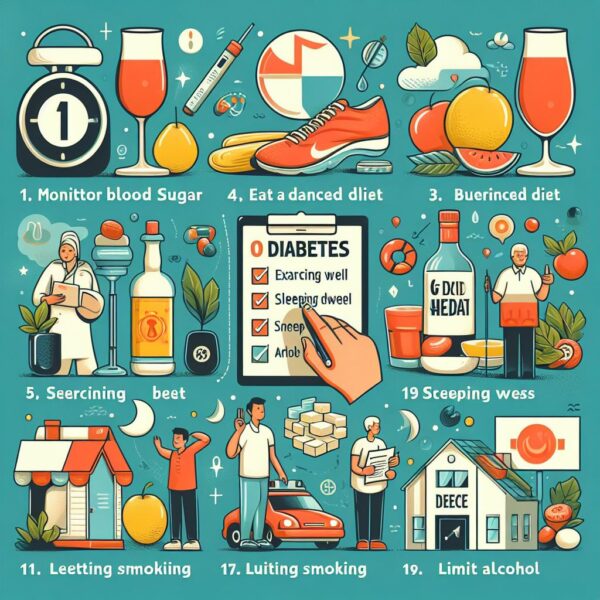Maintain a Healthy Weight
Excess body weight, especially around the abdomen, increases the risk of type 2 diabetes. Aim for a healthy weight by following a balanced diet and incorporating regular physical activity into your routine.
Healthy Diet
Focus on consuming a diet rich in fruits, vegetables, whole grains, lean proteins, and healthy fats. Limit the intake of sugary beverages, processed foods, and foods high in saturated and trans fats.
Regular Physical Activity
Engage in regular exercise to help control weight, improve insulin sensitivity, and lower blood sugar levels. Aim for at least 150 minutes of moderate-intensity aerobic activity or 75 minutes of vigorous activity per week, along with strength training exercises at least twice a week.
Monitor Carbohydrate Intake
Be mindful of the amount and type of carbohydrates you consume, as they can significantly impact blood sugar levels. Choose complex carbohydrates with a low glycemic index, such as whole grains, legumes, and non-starchy vegetables.
Fiber-rich foods promote weight loss and lower the risk of diabetes. Eat a variety of healthy, fiber-rich foods, which include:
- Fruits, such as tomatoes, peppers and fruit from trees
- Nonstarchy vegetables, such as leafy greens, broccoli and cauliflower
- Legumes, such as beans, chickpeas and lentils
- Whole grains, such as whole-wheat pasta and bread, whole-grain rice, whole oats, and quinoa
The benefits of fiber include:
- Slowing the absorption of sugars and lowering blood sugar levels
- Interfering with the absorption of dietary fat and cholesterol
- Managing other risk factors that affect heart health, such as blood pressure and inflammation
- Helping you eat less because fiber-rich foods are more filling and energy rich
Avoid foods that are “bad carbohydrates” — high in sugar with little fiber or nutrients: white bread and pastries, pasta from white flour, fruit juices, and processed foods with sugar or high-fructose corn syrup.
Limit Alcohol Consumption
Excessive alcohol consumption can contribute to weight gain and increase the risk of developing type 2 diabetes. If you choose to drink alcohol, do so in moderation and consider healthier options like red wine in limited amounts.
Quit Smoking
Smoking is associated with an increased risk of type 2 diabetes and other serious health conditions. Quitting smoking can help reduce this risk and improve overall health.
Manage Stress
Chronic stress can affect blood sugar levels and increase the risk of developing diabetes. Practice stress-reducing techniques such as meditation, deep breathing exercises, yoga, or hobbies that you enjoy.
Get Regular Check-ups
Regular medical check-ups can help monitor your health and identify any potential risk factors for diabetes early on. Discuss your risk factors with your healthcare provider and follow their recommendations for preventive measures.
Maintain Healthy Sleeping Habits
Poor sleep quality and duration have been linked to an increased risk of type 2 diabetes. Aim for 7-9 hours of quality sleep per night and establish a regular sleep schedule to support overall health.
Know Your Family History
A family history of diabetes can increase your risk of developing the condition. Be aware of your family history and discuss it with your healthcare provider to develop a personalized prevention plan.
Limited inactivity
Breaking up long bouts of inactivity, such as sitting at the computer, can help control blood sugar levels. Take a few minutes to stand, walk around or do some light activity at least daily.
📍 English Language Educator | Blogger & Content Strategist | 7+ Years in Educational Blogging
Nosheen Bashir is a dedicated English teacher and experienced blogger with over seven years of expertise in content creation and educational writing. Passionate about language, literature, and effective communication, she combines her teaching experience with blogging skills to create insightful, research-backed content that helps learners and educators alike.
🔹 Expertise & Achievements:
✔ English Language Education: A skilled educator with years of experience in teaching English grammar, literature, and communication skills to students of varying levels.
✔ Educational Blogging: Running a successful blog for 7+ years, delivering well-structured, engaging content on language learning, writing techniques, and academic success.
✔ SEO & Content Strategy: Specializes in creating high-ranking, authoritative articles that follow Google’s EEAT principles, ensuring content that is both informative and search-friendly.
✔ Student-Centric Approach: Committed to making English easier, engaging, and accessible, helping readers and students improve their language proficiency.
🚀 With a passion for teaching and writing, Nosheen Bashir is dedicated to crafting educational content that empowers students, teachers, and language enthusiasts worldwide.










